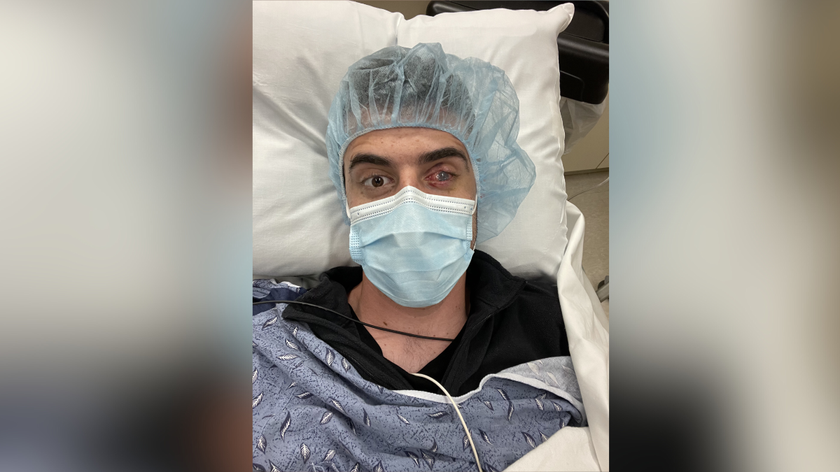Vegan Diet Eases Nerve Pain of Diabetes

For people with diabetes, switching to a plant-based diet may ease the searing nerve pain that can come with the condition, and perhaps reduce their risk of losing a limb, a small pilot study has found.
More than half of adults with Type 2 diabetes may develop diabetic neuropathy, a type of nerve damage resulting from poor blood circulation and high levels of glucose in the blood, previous studies have shown. Diabetic neuropathy can lead to ulcers and other infections on the legs and feet, and is the primary cause of limb amputation for people with diabetes.
There's no cure for diabetic neuropathy; doctors usually treat the pain with medication and advise the patient to remain vigilant about cleaning wounds to prevent infections.
Now, in a new study that builds on previous work suggesting that a plant-based, vegan diet can be as effective as medication for treating diabetes, researchers placed 17 overweight adults with diabetic neuropathy on a 20-week low-fat diet that emphasized fresh vegetables and high-fiber, complex carbohydrates such as beans and whole grains. The participants also attended weekly nutrition classes and took a vitamin B12 supplement, a nutrient that is important for proper nerve function but found naturally only in animal products. [5 Diets That Fight Diseases]
Compared with a control group of 17 adults who received B12 supplements but maintained their current, non-vegan diet, the group on the vegan diet reported significant improvements in pain relief. Tests also revealed improved circulation and nerve function, and these participants lost, on average, 14 pounds.
Many people in this intervention group also saw improvements in their bodies' ability to control their levels of glucose, or blood sugar, which then allowed them to lower the dose of their diabetes medication.
The study appears today (May 25) in the journal Nutrition & Diabetes and was led by doctors and nutritionists at the Physicians Committee for Responsible Medicine (PCRM), a non-profit organization that promotes preventive medicine and a vegan diet.
Sign up for the Live Science daily newsletter now
Get the world’s most fascinating discoveries delivered straight to your inbox.
"We hypothesize that by increasing your insulin sensitivity and improving blood sugar levels, you are allowing your body time to fix the nerve damage," said Cameron Wells, a registered dietitian at PCRM and one of the authors of the study.
Wells described blood with high glucose levels as being "thick" and unable to deliver nutrients to nerve endings.
Normally, glucose is obtained from carbohydrates; and the hormone insulin, secreted by the pancreas, ferries glucose into cells, where it is used as fuel. But in people with Type 2 diabetes, insulin cannot efficiently ferry glucose from the blood into cells for reasons not entirely understood. Thus, the blood becomes laden with glucose.
Maintaining a healthy glucose level is called glycemic control.
"Glycemic control has been shown to prevent development and/or progression of diabetic neuropathy," Dr. David Simpson, a professor of neurology at Mount Sinai Hospital in New York who did not work on the study, wrote to Live Science in an email. "Furthermore, diet and exercise programs, with goal of weight loss, assist in glycemic control and amelioration in progression of diabetic neuropathy."
A study published in 2002 in the New England Journal of Medicine by researchers at George Washington University found that lifestyle changes — diet and exercise — were twice as effective at controlling diabetes than the leading diabetes drug, metformin.
Many of the participants in the new study told the researchers they were impressed by how quickly they lost weight and improved their glycemic control on the plant-based diet, Wells told Live Science.
"It's always so rewarding to see [our patients'] reactions, because it's indicating 'I really am doing something that seems to be working,'" Wells said.
However, the new study was limited in that the researchers could not determine which element of the low-fat, plant-based diet led to the observed improvements. It could be that merely losing weight — albeit no easy task for many — was the main contributor to neuropathy pain reduction, the researchers wrote.
The Centers for Disease Control and Prevention estimates that the annual direct cost of diabetes treatment is more than $175 billion. In the new study, the researchers noted that the cost of a diet rich in leafy greens and other plant foods is well within reach of most budgets.
Follow Christopher Wanjek @wanjek for daily tweets on health and science with a humorous edge. Wanjek is the author of "Food at Work" and "Bad Medicine." His column, Bad Medicine, appears regularly on Live Science.

Christopher Wanjek is a Live Science contributor and a health and science writer. He is the author of three science books: Spacefarers (2020), Food at Work (2005) and Bad Medicine (2003). His "Food at Work" book and project, concerning workers' health, safety and productivity, was commissioned by the U.N.'s International Labor Organization. For Live Science, Christopher covers public health, nutrition and biology, and he has written extensively for The Washington Post and Sky & Telescope among others, as well as for the NASA Goddard Space Flight Center, where he was a senior writer. Christopher holds a Master of Health degree from Harvard School of Public Health and a degree in journalism from Temple University.










